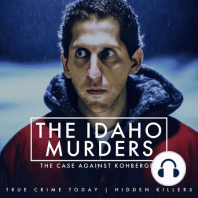16 min listen

Forensic Scientist Dan Krane On Value Of DNA In Kohberger Case
Forensic Scientist Dan Krane On Value Of DNA In Kohberger Case
ratings:
Length:
9 minutes
Released:
Jul 26, 2023
Format:
Podcast episode
Description
Renowned forensic scientist and professor Dan Krane recently joined host Tony Brueski on the popular podcast "Hidden Killers" to discuss the curious DNA evidence entwined in the case of Brian Koberger, the suspect of the Idaho Four murders. Krane, an expert in his field, provided a captivating analysis of the defense's arguments, particularly focusing on the concept of 'ascertainment bias.'
Reports indicate that DNA from three men was discovered at the murder scene. Still, none matched Koberger, prompting defense attorney Jay Weston Logsden to express the need for detailed information on how genetic genealogy was used to identify Koberger as a person of interest. Krane acknowledged the legitimacy of Logsden's critique, pointing out that the CODIS database - a tool regularly used by prosecutors to generate investigative leads - was not used to identify the other two males.
Krane explained that the defense's desire for alternative suspects is understandable, given that they cannot directly access the CODIS database. They would require a court order for the prosecution and law enforcement to search on their behalf.
Furthermore, Krane argued with the state's argument that Koberger's direct DNA match from a buccal swab somehow negates the necessity for genetic genealogy. He labeled this as 'disingenuous,' invoking the concept of 'ascertainment bias.'
Krane clarified this complex term by analogy: "Let's say that there's a one in a million chance that you would have a winning lottery ticket. Ascertainment bias comes into play if you tell me that you've got a winning lottery ticket after having purchased 10,000 tickets. I would be 10,000 fold less impressed that you got the winning lottery ticket than if you'd gotten the ticket from having purchased just one."
In Koberger's case, the defense argues that the police did not randomly select him, but narrowed down potential suspects through a sizable DNA database before focusing on him. Thus, we should be less impressed by the DNA match because of how Koberger was identified. This methodology created the 'ascertainment bias' in this case.
"The key here was how they first identified him. We need to know how big of a net was cast, how many people could have been included as a possible source of the DNA because that's how much we need to downgrade or adjust how impressed we are with the match," explained Krane.
Want to listen to ALL of our podcasts AD-FREE? Subscribe through APPLE PODCASTS, and try it for three days free: https://tinyurl.com/ycw626tj
Follow Our Other Cases: https://www.truecrimetodaypod.com
The latest on Catching the Long Island Serial Killer, Chad & Lori Daybell, The Murder of Ana Walshe, Alex Murdaugh, Bryan Kohberger, Lucy Letby, Kouri Richins, Justice for Harmony Montgomery, The Murder of Stephen Smith, The Murder of Madeline Kingsbury, and much more! Listen at https://www.truecrimetodaypod.com
Reports indicate that DNA from three men was discovered at the murder scene. Still, none matched Koberger, prompting defense attorney Jay Weston Logsden to express the need for detailed information on how genetic genealogy was used to identify Koberger as a person of interest. Krane acknowledged the legitimacy of Logsden's critique, pointing out that the CODIS database - a tool regularly used by prosecutors to generate investigative leads - was not used to identify the other two males.
Krane explained that the defense's desire for alternative suspects is understandable, given that they cannot directly access the CODIS database. They would require a court order for the prosecution and law enforcement to search on their behalf.
Furthermore, Krane argued with the state's argument that Koberger's direct DNA match from a buccal swab somehow negates the necessity for genetic genealogy. He labeled this as 'disingenuous,' invoking the concept of 'ascertainment bias.'
Krane clarified this complex term by analogy: "Let's say that there's a one in a million chance that you would have a winning lottery ticket. Ascertainment bias comes into play if you tell me that you've got a winning lottery ticket after having purchased 10,000 tickets. I would be 10,000 fold less impressed that you got the winning lottery ticket than if you'd gotten the ticket from having purchased just one."
In Koberger's case, the defense argues that the police did not randomly select him, but narrowed down potential suspects through a sizable DNA database before focusing on him. Thus, we should be less impressed by the DNA match because of how Koberger was identified. This methodology created the 'ascertainment bias' in this case.
"The key here was how they first identified him. We need to know how big of a net was cast, how many people could have been included as a possible source of the DNA because that's how much we need to downgrade or adjust how impressed we are with the match," explained Krane.
Want to listen to ALL of our podcasts AD-FREE? Subscribe through APPLE PODCASTS, and try it for three days free: https://tinyurl.com/ycw626tj
Follow Our Other Cases: https://www.truecrimetodaypod.com
The latest on Catching the Long Island Serial Killer, Chad & Lori Daybell, The Murder of Ana Walshe, Alex Murdaugh, Bryan Kohberger, Lucy Letby, Kouri Richins, Justice for Harmony Montgomery, The Murder of Stephen Smith, The Murder of Madeline Kingsbury, and much more! Listen at https://www.truecrimetodaypod.com
Released:
Jul 26, 2023
Format:
Podcast episode
Titles in the series (100)
2: Bryan Kohberger: A Wolf In Sheep's Clothing? by The Idaho Murders | The Case Against Bryan Kohberger